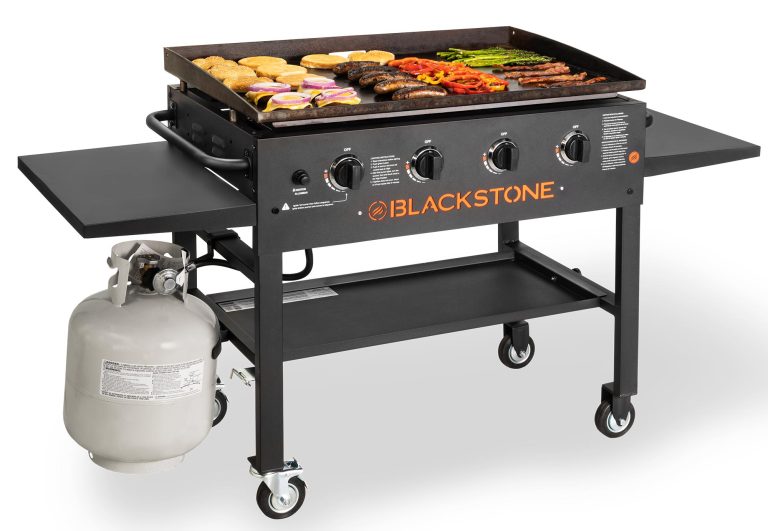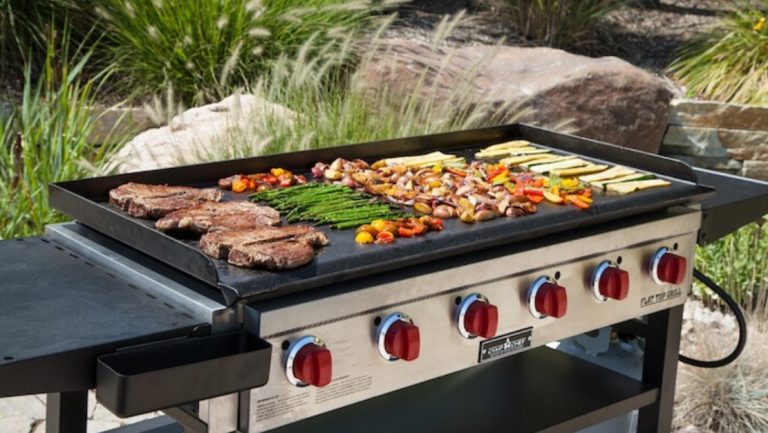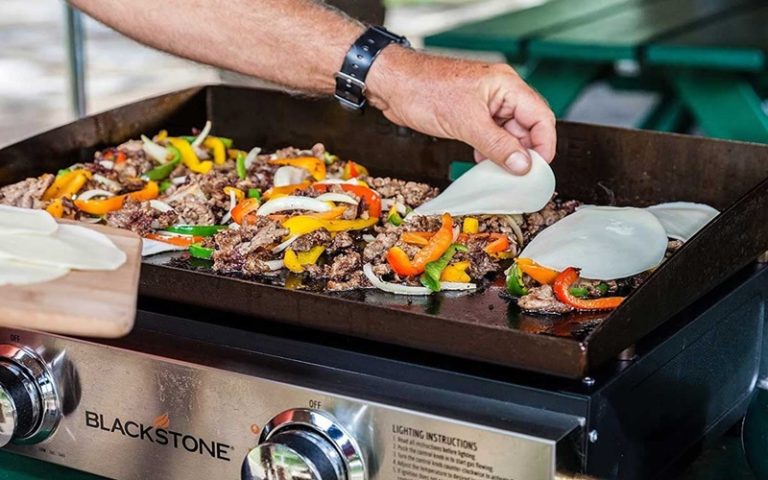Blackstone Grill vs. Weber: Which Grill Is Right for You?
Outdoor cooking is a beloved tradition for many, and when it comes to grilling, two brands often stand out: Blackstone and Weber. Both offer high-quality products, but they serve different types of grill masters. Whether you’re a backyard barbecue enthusiast or someone who loves to cook on the go, understanding the strengths and weaknesses of Blackstone grills versus Weber grills can help you make the best choice. This comprehensive comparison will dive into design, cooking performance, features, and value, helping you pick the perfect grill for your needs.
Introduction to Blackstone and Weber
Blackstone Grills

Blackstone is known primarily for its flat-top griddles, making them stand out in the world of outdoor cooking. Established in 2005, Blackstone has quickly become a favorite for anyone looking to cook a wide variety of foods outdoors. Their signature griddles are considered some of the best outdoor griddles available, perfect for pancakes, stir-fry, fajitas, and even burgers, offering versatility that traditional grills can’t match. Blackstone products are also known for their expansive cooking surfaces and easy-to-clean designs.
Weber Grills

Weber, on the other hand, is a long-standing name in the world of outdoor grilling, having been established in 1952. Known for its high-quality build and superior grilling performance, Weber offers a wide range of products, including gas, charcoal, and electric grills. Their traditional grills are perfect for searing steaks, smoking ribs, and achieving that perfect BBQ flavor. With a reputation for durability and precision, Weber continues to be a go-to choice for traditional grill enthusiasts.
Design and Build Quality
Blackstone Design
Blackstone grills are essentially flat-top griddles made of cold-rolled steel. Their simple design is utilitarian but effective. These grills typically come with large cooking surfaces, allowing users to cook for large groups at once. The griddle design makes it easier to cook delicate items like eggs and pancakes, while also allowing for versatility in cooking techniques.
In terms of portability, Blackstone offers models with foldable legs, making them great for camping or tailgating. However, these grills are generally heavier due to the solid metal construction. Blackstone products also come with shelves and storage areas, making them practical for frequent use.
Weber Design
Weber grills are designed with a more traditional grilling experience in mind. Whether it’s a classic kettle charcoal grill or a sleek gas grill, Weber emphasizes quality craftsmanship. Weber grills are typically constructed from cast aluminum, stainless steel, and porcelain-coated metal, ensuring durability and long-lasting performance.
Weber’s grills are more compact and come in a variety of sizes, making them ideal for those with limited outdoor space. Portable versions, like the Weber Q series, are lightweight and easy to transport. Additionally, Weber is known for the iconic kettle shape that promotes even heat distribution.
Cooking Performance
Blackstone Performance
Blackstone grills are ideal for those who enjoy cooking a wide array of foods. With large flat-top surfaces, you can prepare multiple dishes simultaneously. They heat up quickly and offer precise temperature control, making them perfect for high-heat cooking and slow-simmering dishes alike. This griddle design is ideal for making breakfast foods like bacon and pancakes, but it can also handle burgers, steaks, and stir-fries.
One downside is that Blackstone grills don’t impart that classic smoky flavor you get from open-flame grills. For those seeking a strong BBQ flavor, Blackstone might not be satisfied in that department. However, their versatility and ease of use make them a favorite for chefs who want to cook beyond the basics.
Weber Performance
Weber grills excel in delivering the perfect sear and that unbeatable smoky flavor associated with traditional grilling. Whether you choose a gas or charcoal model, Weber grills distribute heat evenly, making them perfect for cooking meats and vegetables alike. Weber’s charcoal grills, in particular, are famous for infusing food with a rich, smoky flavor that you can’t achieve with a flat-top griddle.
One of the standout features of Weber grills is the ability to adjust the cooking zones, allowing you to create areas of direct and indirect heat. This makes Weber ideal for grilling a wide range of foods, from juicy burgers to low-and-slow smoked ribs. Many Weber grills also come with features like rotisseries and side burners for added versatility.
Fuel Options
Blackstone Grills
Blackstone grills run primarily on propane, making them convenient for quick startup and easy temperature adjustments. Some models offer options to convert to natural gas, but most users stick to propane due to its availability and ease of use. Blackstone’s propane-fueled system ensures consistent heat, which is crucial for griddle-style cooking.
Weber Grills
Weber offers a wider variety of fuel options, including charcoal, propane, natural gas, and electric models. Each fuel type offers different advantages. Charcoal models give that signature BBQ flavor, while gas grills offer convenience and quicker cooking times. Electric models are perfect for people living in places with restrictions on open-flame cooking. The flexibility of fuel options makes Weber a more versatile choice for different lifestyles and cooking preferences.
Ease of Use and Maintenance
Blackstone Grills
One of Blackstone’s main selling points is its ease of use. Their flat-top griddles are straightforward, requiring minimal effort to master. Once you’ve finished cooking, the griddle surface is easy to clean—just scrape off food residue, wipe it down, and apply a little oil to prevent rust. However, Blackstone griddles require regular seasoning to maintain their non-stick surface and prevent rust.
Weber Grills
Weber grills, particularly the gas models, are also designed for ease of use. The ignition system ensures a quick start, and temperature control knobs make it simple to adjust the heat. Charcoal models are slightly more challenging to maintain because they require handling ashes and mastering charcoal arrangement for consistent heat.
In terms of cleaning, Weber grills are relatively easy to maintain. The removable grates and drip pans simplify cleanup, though charcoal grills need a bit more attention. Weber’s durability and long lifespan mean that your investment will last for many years if properly cared for.
Price Comparison
Blackstone Pricing
Blackstone grills are generally more affordable than Weber grills, with entry-level models starting at around $150. Larger models with more features can go up to $500. For those looking to feed large groups without breaking the bank, Blackstone offers a great balance of price and functionality.
Weber Pricing
Weber grills tend to be more expensive, with charcoal models starting around $120 and gas grills reaching up to $1,000 or more for premium models. The higher price point reflects the durable materials, superior construction, and additional features. Weber’s extensive warranty programs and long-lasting quality also make their products a worthwhile investment for dedicated grill enthusiasts.
Pros and Cons of Blackstone and Weber Grills
Blackstone Pros:
- Versatile flat-top cooking surface.
- Affordable.
- Great for large gatherings.
- Easy to clean.
Blackstone Cons:
- No smoky BBQ flavor.
- Requires regular seasoning to prevent rust.
Weber Pros:
- Excellent for achieving a smoky flavor.
- Multiple fuel options.
- Durable and long-lasting.
- Versatile cooking options with accessories.
Weber Cons:
- More expensive.
- Charcoal models require more time and effort to maintain.
Which Should You Choose?

Choosing between a Blackstone grill and a Weber grill comes down to your cooking preferences and lifestyle. If you love versatility and enjoy making a wide variety of dishes outdoors, the Blackstone grill is your best bet. It’s perfect for feeding large groups, offers excellent temperature control, and is generally more affordable.
However, if you’re a fan of traditional grilling and crave that smoky BBQ flavor, Weber is the way to go. With a variety of fuel options and models to choose from, Weber provides a classic grilling experience that can’t be matched by a flat-top griddle.
Conclusion
In the battle of Blackstone vs. Weber, neither brand is definitively better than the other—it all depends on your individual needs. For flat-top griddle enthusiasts, Blackstone is a fantastic option, offering versatility and value. For traditional grillers who love the smoky flavor and prefer a wider range of grilling techniques, Weber is the gold standard. Both brands have strong reputations, and no matter which one you choose, you’ll be well-equipped for your next outdoor cooking adventure.

James Carter is the founder of BestOutdoorGriddle.com, a website dedicated to helping outdoor cooking enthusiasts find the best griddles for their BBQ and camping needs. Based in Dallas, Texas, James combines his passion for outdoor cooking with his expertise in product research to provide comprehensive reviews and guides. With a keen eye for quality and functionality, James strives to help fellow grill masters make informed decisions when selecting outdoor griddles. Through his website, he aims to enhance the outdoor cooking experience for barbecue lovers and campers alike.





